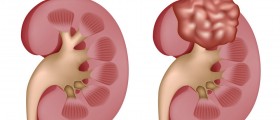
Tumor lysis syndrome represents a group of metabolic imbalances which develop due to certain cancer treatments. Namely, this syndrome generally affects patients with bulky and rapidly proliferating tumors who are treated aggressively and in whom the treatment leads to quick response in a form of death of many tumor cells.
Tumor lysis syndrome mostly affects patients suffering from non-Hodgkin lymphoma and Burkitt's lymphoma. It can also occur in other hematologic malignancies and several more solid tumors.
Tumor Lysis Syndrome - Pathophysiology
The effects which occur as a part of tumor lysis syndrome are a consequence of rapid death of large number of tumor cells. They generally develop due to the presence of many intracellular ions as well as formation of numerous metabolic products which all, once they are released into the bloodstream, may induce severe damage to different organs and organ systems.
Depending on the particular substance which is increased a person suffering from tumor lysis syndrome may develop hyperuricemia, hyperkalemia, hyperphosphatemia, hypocalcemia and in more severe cases one may even end up with acute renal failure.
Tumor lysis syndrome most commonly occurs within 48-72 hours after the onset of cancer treatment. It is essential to recognize the condition as soon as possible and react timely with proper treatment. Only this way patient's life can be saved.
Prevention of Tumor Lysis Syndrome
This complication of cancer treatment can be timely prevented. It is essential for all high-risk patients to be identified and they should receive preventive therapy. Similarly, if one has not received preventive therapy, he/she must be closely monitored for potential complications after the treatment. The doctor is due to check for any sign of metabolic or renal complications.
Patients who are supposed to receive chemotherapy and whose cancer features with a high cell turnover rate (particularly patients suffering from lymphomas and leukemias) must be treated prophylactically. Namely, they should receive allopurinol either orally or intravenously. Furthermore, they are supposed to be well-hydrated throughout the entire treatment. Allopurinol will allow excretion of certain metabolic products created due to tumor necrosis. One more drug which can be administered in such patients is rasburicase. It is highly suitable for all patients who are at higher risk of developing tumor lysis syndrome.
Treatment for Tumor Lysis Syndrome
In case, in spite of preventive measures, tumor lysis syndrome eventually occurs, patients must be hospitalized and treated as soon as possible. It is significant to monitor the level or electrolytes and check renal function. Allopurinol can be administered in such patients in order to prevent urate nephropathy and associated oliguric renal failure. Proper hydration, diuretics and finally dialysis can take care of maintaining adequate amount of fluids inside the body and allow all the detrimental substances to be eliminated form the body.

















Your thoughts on this
Loading...